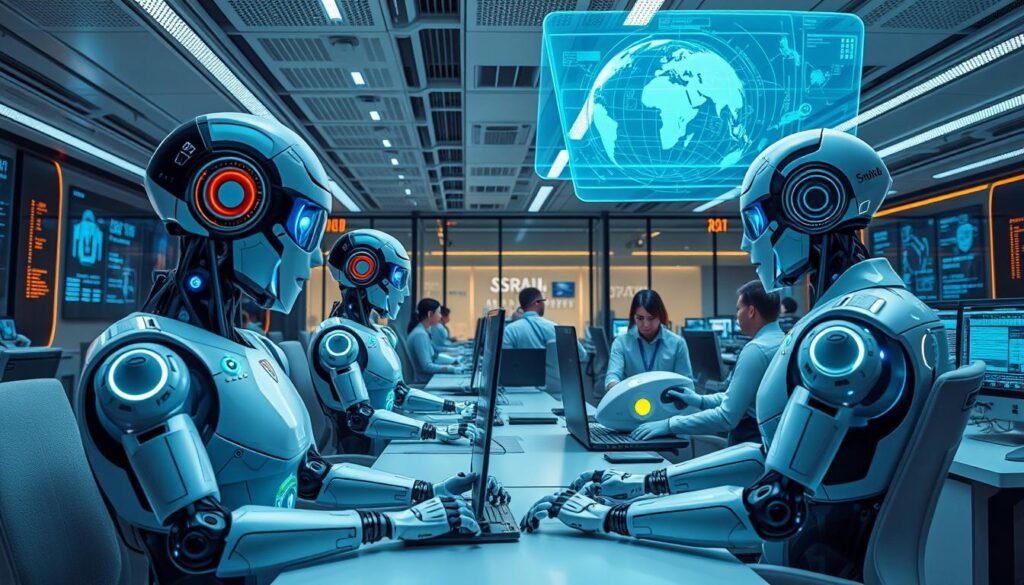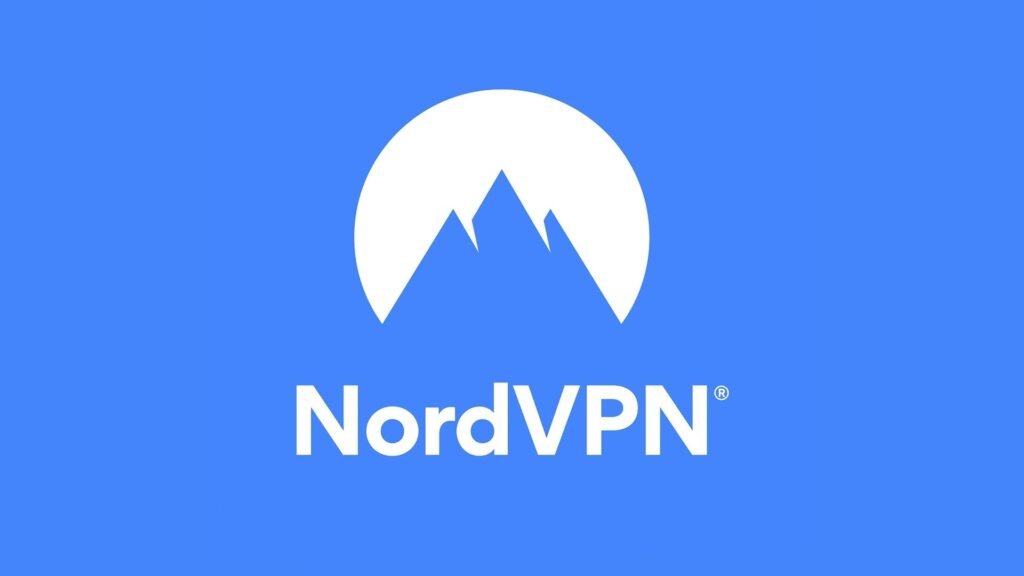Did you know that nearly 47% of jobs in the U.S. could be automated by AI in the next 20 years? This is what a 2013 study from the University of Oxford found. It shows how artificial intelligence impact on employment is big today and will be even bigger in the future1. AI is changing the job market by making things more efficient and changing what jobs are like.
About 52% of companies have sped up their AI plans because of the pandemic. They see AI as key to their success2.
As companies in different fields start using AI, jobs are changing. AI might make some jobs disappear, but it also creates new ones. By 2021, 86% of companies said AI was important for their work. They need people who know about robotics, data analysis, and IT skills2.
This article aims to show how AI is changing the job world. It's important for you to learn and grow to keep up with these changes.
Key Takeaways
- • 47% of jobs could be automated by AI over the next two decades.
- • 52% of companies accelerated their AI strategies due to the pandemic.
- • 86% of organizations consider AI crucial for business operations.
- • AI is set to create 20-50 million new jobs globally by 2030.
- • Adapting to AI changes requires a focus on building relevant skills.
Understanding the Impact of AI on Employment
Artificial intelligence is changing how we work. It automates tasks, making jobs more efficient but also challenging for workers. People need to understand how AI affects jobs in different fields as we move forward.
Overview of AI Integration in Workplaces
AI is making workplaces more productive and organized. For example, jobs that involve a lot of manual work or routine tasks are more likely to be replaced by AI. This means we need to think about how AI will change the way we work.
Statistics on AI Job Displacement
Studies show that AI is causing a lot of job changes. Goldman Sachs thinks AI could replace up to 300 million jobs in the U.S. and Europe3. McKinsey says AI could automate 29.5% of U.S. jobs by 2030, up from 21.5% now3.
By 2030, 2.4 million jobs might be lost, but 11.08 million could change3. Women and minorities are at higher risk, showing the need for training to keep jobs3. Knowing these numbers helps us see how important it is to prepare for an AI-driven future.
The Benefits of AI in the Workplace
AI is changing the workplace in big ways. By using AI, you can make your work better. You'll see more efficiency and productivity, and even get to try new jobs.
Increased Efficiency and Productivity
AI makes work more efficient. It helps with tasks like writing and customer service, especially for new workers4. This means you can do more creative work.
AI also automates boring tasks. This makes 77% of leaders trust it to share information right5.
The Creation of New Job Opportunities
AI might make some jobs go away, but it also creates new ones. Jobs in data analytics and AI ethics need special skills6. This changes the job market.
As companies use AI more, they need people to manage it. This means more jobs for those who learn and adapt. Using AI in work doesn't just change jobs; it opens up new paths for growth.
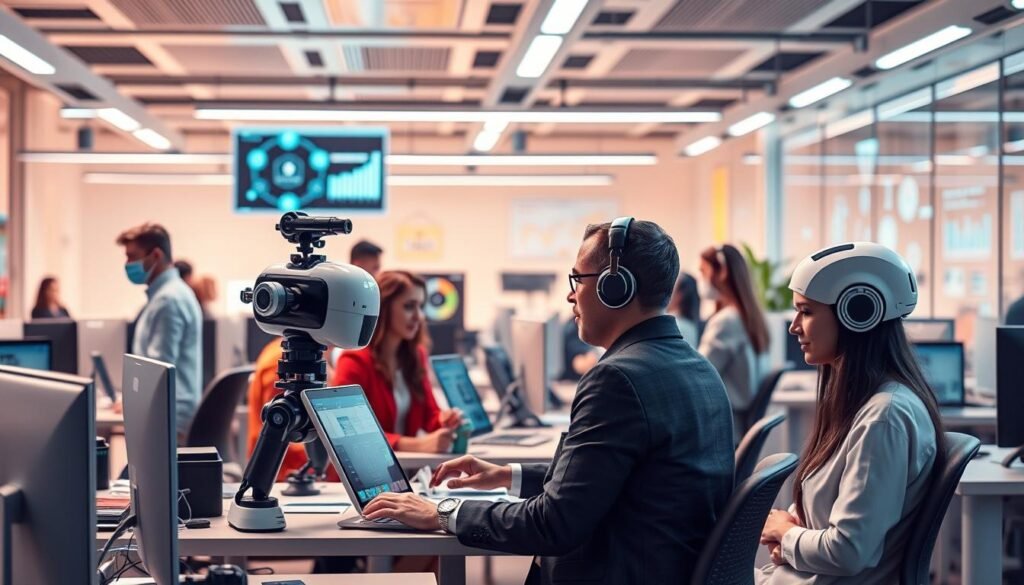
The Risks Associated with AI Job Automation
Artificial intelligence (AI) is changing many industries fast. This change raises big worries about losing jobs. It's key for workers in these fields to understand these risks.
Job Displacement Concerns
AI could lead to a lot of job losses. By 2030, up to 2.4 million jobs might disappear. Finance, customer service, and manufacturing are at high risk because they often need manual work and simple tasks.
More companies are using AI, and 45% think it will cut jobs a lot in the next five years. This makes workers very worried7.
Sectors Most Affected by AI Automation
Jobs that are repetitive are most at risk from AI. Workers might feel stressed and lose their sense of purpose8. On one hand, many jobs might become outdated. On the other, new jobs need advanced tech skills.
This shift makes finding new jobs hard. It can also make income gaps wider8.
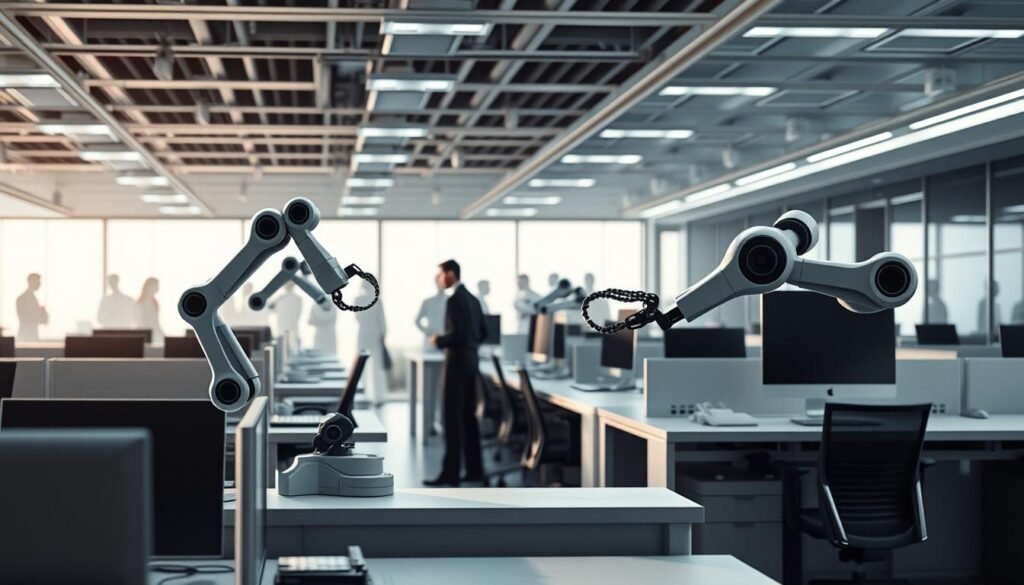
| Sector | Job Displacement Risk | Potential for Job Creation |
|---|---|---|
| Finance | High | Low |
| Customer Service | High | Moderate |
| Manufacturing | High | Moderate |
| Technology | Moderate | High |
| Healthcare | Low | High |
How AI is Changing the Job Market: What You Need to Know
The job market is changing fast, thanks to technology. Current AI trends show big changes coming in 2024. Many jobs are getting better with AI, making work more efficient and changing what we do.
There's a big need for people who know AI. This could mean a 25% pay increase for those skilled in AI.
Current Trends in AI through 2024
The AI market is set to grow to $407 billion by 2027. A lot of businesses think AI will make them more productive. But, about 15% of US jobs might be lost to AI9.
AI could also create 97 million jobs, but 2.4 million jobs might be lost in the US by 20309. This shows AI's impact is complex.
The Future Outlook for AI in Various Industries
AI is slowly changing industries. By 2024, 44% of companies might lay off workers because of AI10. But, 83% of people think knowing AI will make their jobs safer10.
By 2025, 85 million jobs might be lost to automation, but AI could also create new ones11. This means big changes in AI in various industries11.
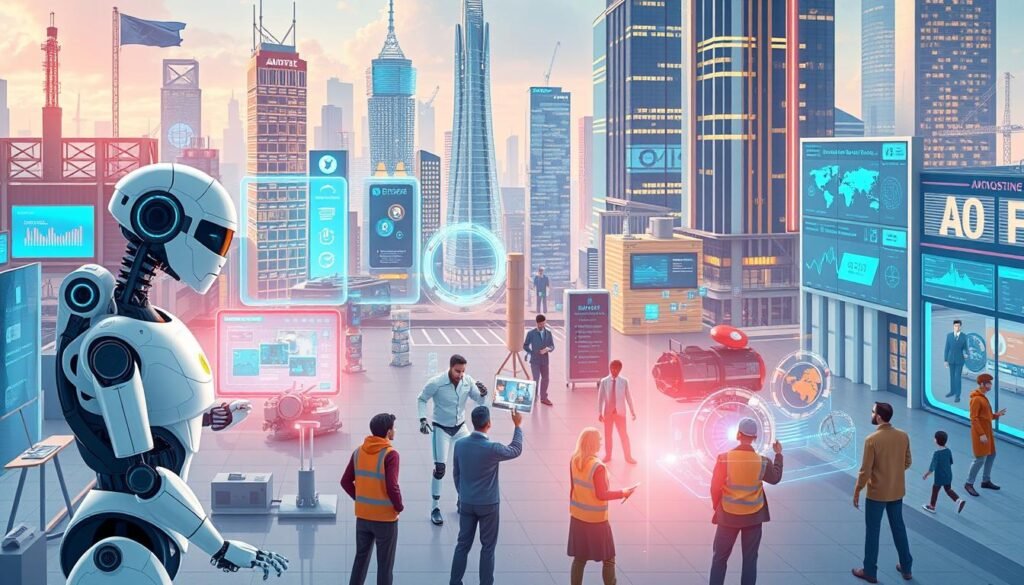
Investing in AI Skills for Career Advancement
The job market is changing fast, moving towards AI technologies. Upskilling for the AI workforce is key for your career growth. With 76% of workers seeing AI skills as crucial, the demand for skilled workers is rising12.
Employers want candidates who know AI, data analytics, and technical skills. This shows a big shift in what employers look for.
The Importance of Upskilling for the AI Workforce
Adapting to new skills is crucial. For example, areas with lots of AI see 4.8 times more productivity growth12. It's important to update your skills to meet market needs.
Jobs needing AI skills are growing 3.5 times faster than others12. Taking AI certification courses, like those at UTSA PaCE, can help. They give you hands-on experience needed today13.
Why AI Skills Are in High Demand
AI is used in many fields, like healthcare and manufacturing. Healthcare uses AI for personalized medicine, and manufacturing for better productivity13. 79% of workers say AI skills open up more job chances12.
| Industry | AI Applications | Growth Opportunity |
|---|---|---|
| Healthcare | Personalized medicine, data analysis | High |
| Manufacturing | Predictive maintenance, production optimization | High |
| Retail | Inventory management, consumer trend prediction | Medium |
| Finance | Fraud detection, algorithmic trading | High |
In summary, investing in AI skills is not just about keeping up. It's about thriving in an AI-driven job market13.
How Companies are Restructuring Roles in Light of AI
Companies are changing how they organize work because of AI. They're updating job descriptions and what skills are needed. This change helps them use AI better and meet market needs.
They're focusing on both technical skills and soft skills like talking well, understanding others, and being creative. This mix is key for the AI workplace.
Redefining Job Descriptions and Skill Requirements
AI is making companies rethink their jobs. About 25% of workers worry AI might make their jobs obsolete14. Over 70% of HR leaders think AI will replace jobs in three years14.
This means jobs need to change. Workers must be ready to adapt and learn quickly.
Examples of New Roles Created by AI Adoption
AI has brought new jobs to many fields. Jobs like machine learning engineers, AI ethicists, and data analysts are now common15. AI is also creating jobs in healthcare, finance, and education15.
Companies need people to make their own AI systems. This shows the growing need for new job roles in AI16. The job market will keep changing with AI, making some skills more important16.
The Role of Higher Education in Preparing for an AI-driven Workforce
Higher education is key in getting students ready for an AI-driven job market. With more focus on AI and machine learning, universities are stepping up. They're changing their programs to meet the needs of the changing job world.
AI Programs and Courses in Universities
In the U.S., many universities now offer in-depth AI courses. These courses aim to give students the skills needed for new jobs. Over the last five years, there's been a 35% rise in AI programs offered by schools17.
Online AI courses have seen a huge jump, with a 250% increase in enrollment last year17. This shows that people want to learn more about AI.
Continued Learning Opportunities and Resources
With AI changing jobs, lifelong learning is crucial. By 2030, up to 375 million workers might need to find new jobs17. It's important for people to keep learning.
Students who do AI internships have a 70% better chance of getting a job in AI17. Schools should focus on both technical and soft skills, like teamwork and critical thinking.
| Program Type | Number of Institutions Offering | Increase Over Five Years | Enrollment Growth Last Year |
|---|---|---|---|
| AI and Machine Learning Degrees | 1,250+ | 35% | 250% |
| AI Certifications | 800+ | N/A | 200% |
| AI Internships | 500+ | N/A | N/A |
Good education policies should prepare students for jobs and address inequality18. By investing in education, we can close the skills gap and make the job market fairer.
Strategies for Professionals to Adapt to AI Changes
The job market is changing fast because of AI. You need to find ways to adapt to these changes. Learning new technologies is key to improving your skills and role.
As AI gets better, it's important to use these tools in your work. This will help you stay ahead in your field.
Embracing AI Technologies
To succeed, look for chances to learn more and use AI in your daily tasks. With AI, new jobs are being created in tech fields. For example, J.P. Morgan is using AI for fraud detection and investment strategies.
This shows the need for skills in data science and analysis. In healthcare, IBM Watson is helping doctors make personalized treatment plans. This shows how AI can change things for the better.
Building a Professional Network for Support
It's also important to build a strong professional network. Talking to others in your field can help you learn and stay updated. A Michael Page survey found that 45% of people think AI will change their career plans.
Having a network can offer support during these changes. It's also important to keep relationships strong. This is especially true in finance and legal services, where teamwork and understanding are key.
| AI Integration Benefits | Skills Required | Industries Affected |
|---|---|---|
| Increased Productivity | Data Analysis & AI Management | Finance & Banking |
| Streamlined Customer Service | Customer Relationship Management | Media & Marketing |
| Enhanced Creative Opportunities | AI-enhanced Creativity | Healthcare |
| Job Creation in Tech | Cybersecurity | Legal Services |
By focusing on learning new tech and networking, you can do well in an AI world. It's important to keep learning and be adaptable. Many people think that by 2030, jobs will need more AI skills.
Conclusion
The job market is changing fast with AI's growing role. Soon, about 70% of companies will use AI by 2030. This change is not just about losing jobs; it's also about creating new ones.
As AI takes over some tasks, humans will focus on more complex jobs. This shift could lead to about 133 million new roles19. Staying updated and flexible is key in this new world.
Knowing the good and bad sides of AI is important. While AI might replace some jobs, it will also open up new ones in fields like data science and cybersecurity1920. Learning new skills, especially in AI ethics and machine learning, will be vital.
By being smart about AI, you can boost your career. The future job market will value those who keep learning and think creatively. This way, you can work well with AI and thrive in the new job market.

